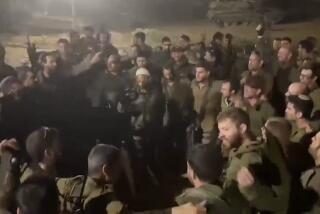THE PAPAL VISIT : Jerry Brown Puts On Yet Another Mantle: Papal Commentator
A tight shot of Pope John Paul II, brow furrowed, lips fluttering as he knelt in prayer, filled the television screen. For a moment the only sound coming from the set was a choir singing the delicate, melancholy strains of “Ave Maria.” And then, somewhat jarringly, there came an unexpectedly familiar voice.
At once high-pitched and husky, the voice belonged to former Gov. Edmund G. Brown Jr., Jesuit seminarian, presidential contender, trained lawyer, student of Eastern religion and, now, papal commentator.
“I think,” Brown told the television audience Friday as the Pope prayed in St. Mary’s Cathedral, “that the power of this man is not in his persona or something superficial. It is in the depth of his conviction.
“I don’t think we want to change him too much,” he said of those advocating more liberal Vatican policies. “I think we want to change ourselves.”
Courtesy of the ABC affiliate here, Jerry Brown’s voice could now be added to the chorus of those who would assess this nearly finished papal tour. Brown came well-equipped for his role as papal color man--a practicing Catholic interested in the mystical and a politician who understands the mechanics of public life in the modern world. He had also done his homework.
His performance Thursday night and Friday was typically cerebral, focused on what he perceived to be the big picture, but it did produce one surprise: The Democrat who once compared politics to paddling canoes, a few strokes on the left, a few strokes on the right, and a man who last surfaced in Japan studying Zen Buddhism is anything but iconoclastic when it comes to the Roman Catholic Church. In fact, he came across as a conservative Catholic.
Brown thought that the papal visit was being wrongly measured. The Pope’s mission could not be found in the texts of more than 40 speeches John Paul has given in the United States, in policy positions on such matters as the role of women or abortion. Rather, Brown said, the importance was in the presence of the Pope himself and in his spiritual message.
“The Pope has not come here to find social workers,” Brown said.
“The words we hear often,” he went on, “but the mystique of the papacy and the way he presents it, and the way he is into the Mass, the way he walks into a church and touches people, you have this very powerful sense that is not found too often, that is unique. Mother Teresa and a few others have it.”
Later, during a break, Brown elaborated on his theme. He said the papal visit “works because the central need of any church is the manifestation of spiritual experience, or what you might call depth of conviction or the presence of the spirit. I believe this man manifests this in his own life and in his way of presenting himself, in the Mass and in the ceremony and how he speaks. . . .
“Here we have a man who is pre-modern in a sense, who is coming out of the very different reality of prewar Poland and experiencing the war. We are getting a life experience very different from suburbanized, upwardly mobile, secularistic, consumeristic, yuppie-ized America. And maybe that is what I am sensing here, and what I perceive is vital to a reawakening of the church, and the whole society for that matter.”
Brown was one of five commentators hired for an undisclosed fee by KGO-TV for its papal coverage. As in every city along the route, the presence of the Pope has been cause for fierce competition among media to be the first with the most answers--or at least provocative questions--about how the visit unfolded. In Brown, the station had a thoroughbred for this electronic race. The former governor came to the studio each day in a double-breasted suit. He is these days sporting a beard, richly streaked with white hair. Curiously, the beard looks better in person than on television, where it gives him the appearance of an old prospector in Sunday duds.
The small talk that is the stock in trade of local television news was not Brown’s strength.
“Good morning, governor. Did you get some sleep?” the anchorman asked Brown cheerily Friday morning as he arrived on the set.
“A little bit, yes,” Brown replied, and that was about it for glib chatter.
What Brown wanted to talk about was the papal mystique, the presence projected by John Paul, the potential staying power of his message.
“There is a lot of excitement right now, but is this an Ollie North phenomenon or is this a real change?” he wondered.
In his on-air comments and also in an interview, Brown was a supporter of the ritual and tradition embodied by the Pope. He gave the sense that he would almost rather hear Mass celebrated again in Latin, although he denied this was the case.
“What is so striking,” Brown said, “is that the falloff in Catholic participation appears to be correlated with the innovations. . . .
“Ritual to be ritual has to be invariable. And it draws a lot of its power from the fact that it is repeated without change for a long time, and it has been in the context of the central experiences of life--birth, baptism, marriage, reconciliation, Mass, death. And as you start tinkering with these things, you start upsetting the confidence that people have invested in them at a very deep, perhaps unconscious, level.
“My expectation from the church is not that we get social work or political advice or economic recommendations, but that we get access to the deeper and mysterious levels of existence. That is what I want to know more about and encounter, and these other things--whether it’s economics, psychology or politics--I know numerous sources to find that.”
Brown, who was in the news last January when he was discovered studying Zen Buddhism in Japan, said he considers himself a practicing Catholic. He had delved into his papal assignment, regularly picking the brains of former associates who were working on the papal visit in the Los Angeles archdiocese.
He interpreted a lay woman’s address to the Pope in St. Mary’s as newsworthy by the mere fact that it happened in a church long suspected of sexism. “The medium is the message,” he said, without blushing.
Shared Experiences
Brown shared with his audience experiences that he had in China attending Mass and predicted that China and the Soviet Union might soon be visited by John Paul.
At the conclusion of the last broadcast, just minutes after the Pope completed Mass at Candlestick Park and departed for Detroit, the KGO anchor told his stable of commentators the time had come for “a summing up.”
Brown, for his part, reflected how the Pope had brought a message that many of the American faithful perhaps did not want to hear.
“He is a contradiction, and he is a mystical representative of this otherworldly religion,” the former governor said. “And that is why he is here, and I can’t think of a better place to deliver that message.”
He said watching the Pope had been “moving.”
More to Read
Start your day right
Sign up for Essential California for news, features and recommendations from the L.A. Times and beyond in your inbox six days a week.
You may occasionally receive promotional content from the Los Angeles Times.







